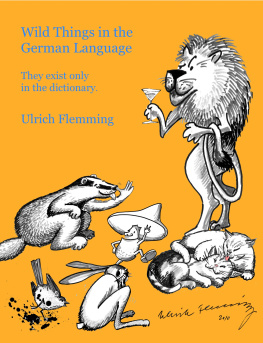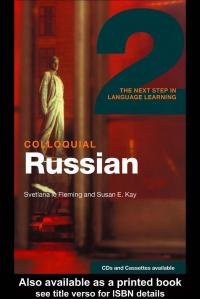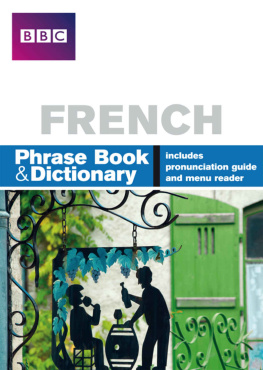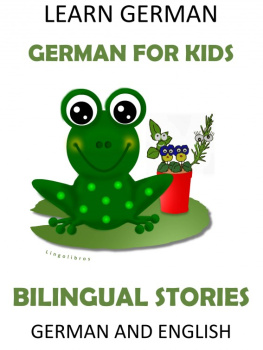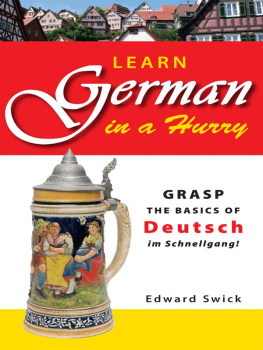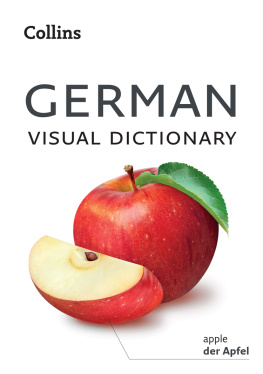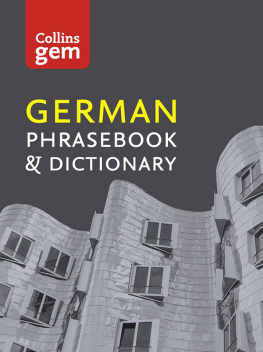ISBN-10: 0-9852535-4-1
ISBN-13: 978-0-9852535-4-7
2013 Ulrich Flemming
All rights reserved.
Wild Things in the German Language
i
This is a book for people interested in German, either because they speak it or because they are learning it and want to increase their vocabulary. Each word I introduce is accompanied by a drawing, which, I hope, will make learning fun.
A little bit of background: The drawings collected in this book first appeared as part of the Word-of-the-Month feature on my blog . There I introduce German words that have no exact equivalent in English, but also haven't entered English yet as foreign words (like for example Weltschmerz or Schadenfreude ). My readers seem to be particularly interested in German compound nouns that hitch together seemingly unrelated words in order to express a nuanced meaning that otherwise would have to be captured by a much wordier phrase. An example is Schlimmbesserung , which combines schlimm (bad) with Besserung (improvement) in order to succinctly denote an effort to improve something that actually makes things worseit's a reform gone wrong.
As I was searching for suitable Word-of-the-Month candidates, I came across compound nouns that attach a certain feeling, character trait, attitude, or habit to an animal (or, in a few cases, a plant). An example is Dreckspatz , which combines Dreck (dirt) and Spatz (sparrow) to refer to a person, especially a child, who is prone to get dirty, for example, by playing in the mud, and shows little interest in cleanliness. Note that a Dreckspatz , as a bird, does not exist in the real worldits habitat is the dictionary, and the dictionary only.
At the same time, I rediscovered my love for free-hand drawing (which had atrophied during the decades I worked with computer-aided design software), and I started to draw the "creatures" in question as cartoons. The challenge was to depict them in a way that makes the connection to an existing animal or plant clear, but imbues them at the same time with the characteristics a particular word refers to. The present book shows what I have accomplished so far.
My artistic ambition is quite modest. As an architect, I have a certain facility with drawing utensils, and that's all I claim. I've reached my goal if I make readers smile or, for students of German, lighten the essentially arduous task of memorizing words in that language.
Note, too, that in studying the words illustrated here, readers will not only learn these words as they stand, but also the components out of which they are composed. And additional words are introduced in the explanations I have provided for each entry. After going through the book, readers will be able to impress native German speakers, who will not expect foreigners to know the words illustrated in Wild Things in the German Language .
Thanks to Michael Dany, Dietrich Gottwald, Thomas Kreifelts, and Volker Sayn for their suggestions, some of which have made it into the book, and to Laraine for her encouragement and advice, not only when it comes to the English language, but to life in general.
Introduction
Good Company
Glckspilz combines Glck (good fortune, happiness) with Pilz (mushroom). It refers to a person in luck, particularly one who always seems to get lucky.
I have the suspicion that the term has something to do with the fact that the consumption of certain mushrooms makes people happy.
Note on pronunciation . The z at the end of Pilz is pronounced like a very sharp ts.
Der Glckspilz

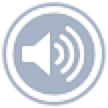
Schmusekatze combines the verb schmusen (to snuggle, cuddle) with Katze (cat). It denotes someone who likes to snuggle with or cuddle another person, possibly as prelude to other activities with that person.
It's interesting to compare German schmusen and Yiddish schmooze , which are clearly related. But they differ in meaning: Schmooze is all talk, while schmusen is all actiontalking would break the mood.
Note on pronunciation . Four distinct syllables: SHMOOzehkattseh. The main stress is on the first syllable; the third one gets a secondary stress.
Christopher and Jenny, who modeled for my cat drawing, were the best Schmusekatzen (that's the plural) we ever had.
Die Schmusekatze

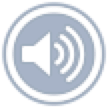
See (fem.) means "sea" and Br means "bear." Seebr is usually used together with alt (old): Ein alter Seebr is the German equivalent of "an old tar" or "an old salt." By the way, See (masc.) means lake.
Note on pronunciation . Br rhymes with English "fair," not "bear." English speakers have more problems with See , which is not pronounced like ; i.e., the lips do not close as you say itthey stay in the same position the entire time. A good exercise is to keep saying "eh" with open lips held in the same position until you run out of breath.
Long after I had posted my drawing, I learned that Seebren (that's the plural) actually exist. They are called "fur seals" in English and endangered, not so much because of hunting, which has been outlawed, but because of overfishing, which reduces their food supply. But endangered or not, a Seebr no longer fits the subtitle of this book.
But I decided to keep him anyway. First of all, it's not clear that the metaphorical use of the term really derives from the fur seala crusty, deeply-tanned old sailor, walking with his legs spread apart as if he were still negotiating a rolling deck, certainly resembles a brown bear more than a fur seal. Secondly, I had too much fun doing the drawing!
Der Seebr

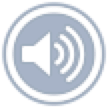
Party Animals
Salonlwe literally means "lounge lion" and refers to a socialite displaying more style than substance (all that attention paid to hair!). He's well-dressed and well-educated and wants to be the center of attention, but when he gets it, he turns out to be shallow.
It's tempting to compare the German animal to the English "lounge lizard," but I have the sense that the German expression does not connote a slithering parasite, a gigolo who lives off women, which English definitions of "lounge lizard" stress.
Der Salonlwe

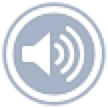
Schnaps (one p!) should be known to English speakersit's a generic term for any hard liquor; a Drossel is a thrush; and Schnapsdrossel is a colloquial moniker for a boozer.
I thought initially that the term has its origin in the fact that alcohol, in Germany and elsewhere, leads some people to song. But I learned later that the Drossel in Schnapsdrossel has nothing to do with birds. It's an old name for "throat," which survives in modern German in the verb erdrosseln (to strangle)it must have the same Germanic root as "throttle." So, a Schnapsdrossel is really a throat through which liquor flows freely. [ Sick 2012 ]
Next page
